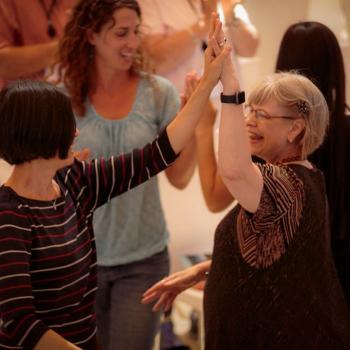
While Christians all have one and the same calling – that is, to be united with God and participate in the divine life, each person will find the way they do this will be different from each other. God’s nature infinitely transcends the capacity of human nature, so that there is an infinite variety of ways for human persons to interact with and integrate themselves into the divine life. Thus, every Christian, indeed, every human person, will have a different focus which they use in their walk with God, which is why it is impossible to establish one way of life for every Christian. Christians should see the good in the ways others are called to walk with God, even as they should see how all Christians can and should come together, complementing each other, so that together, they better represent the way of God than they would individually. Similarly, our particular focus should not be used to undermine or deny the greater good, and that means, even with such a given focus, we can and will engage many other concerns as they come up. What is important is that we do what we can to engage God within our own particular context, doing so with discernment, determining which qualities (uncreated energies) which we associate with God are those which we are most naturally attuned to and act upon. If we do this properly, we can be said to be walking with God, and God will be with us. Thus, as we read in the Sayings of the Desert Fathers:
A brother questioned an old man, saying, ‘What good work should I do so that I may live?’ The old man said, ‘God knows what is good. I have heard it said that one of the Fathers asked Abba Nisterus the Great, the friend of Abba Anthony, and said to him, “What good work is there that I could do?” He said to him, “Are not all actions equal? Scripture says that Abraham was hospitable and God was with him. David was humble, and God was with him. Elias loved interior peace and God was with him. So, do whatever you see your soul desires according to God and guard your heart.”’[1]
Some of us will be more like Abraham, David, or Elias, but there are also many other possibilities, many other walks of life, which we can engage. Some will be more like Moses, a dedicated religious leader who works for the liberation of their people; others will be like Mary Magdalene, someone who is so close to God, their focus will be contemplation; others, likewise, will be like Ruth, someone who becomes a loyal companion to those in need, and others will be like Esther, someone who knows how to use their natural abilities to help influence the government to protect and defend those in need. And, again, while each one of us will have a different focal point for our walk with God, we should not hold it so exclusively we let the good associated with it become detached from the greater good, undermining the virtues we can and should develop as a result of our walk with God. That might even mean, we will have to act contrary to our focus — for example, even if we are called to life of fasting, we still need to eat from time to time; even if we are called to a life of contemplation, we should not embrace a quietest retreat from the world, ignoring our responsibility to help those who come to us. We must engage prudence, making sure we do not turn our focus into some sort of absolute; we must engage it with flexibility, discerning when we might need to do something other than our norm. We must be open to God’s inspiration to us, using it as an aid to our prudential judgment so it can better determine when to act differently or even to have us change our focus if God wills us to do so:
Abba Nisterus said that a monk ought to ask himself every night and every morning, ‘What have we done that is as God wills and what have we left undone of that which he does not will?’ ‘He must do this throughout his whole life. This is how Abba Arsenius used to live. Every day strive to come before God without sin. Pray to God in his presence, for he really is present. Do not impose rules on yourself; do not judge anyone. Swearing, making false oaths, lying, getting angry, insulting people laughing, all that is alien to monks, and he who is esteemed or exalted above that which he deserves will suffer great harm.’[2]
Not only should we resist sin, we must strive for virtue. Our prudence should help us determine the kind of self-discipline we should engage. We must abandon what leads us astray, learning to gain control of ourselves. Thus, if we have a tendency to be uncharitable in our speech, we need to learn to control ourselves, which means, we need to learn how to be silent:
Abba Joseph said to Abba Nisterius, ‘What should I do about my tongue, for I cannot control it?’ The old many said to him, ‘When you speak, do you find peace?’ He replied, ‘No.’ The old man said to him, ‘If you do not find peace, why do you speak? Be silent and when a conversation takes place, it is better to listen than to speak.’ [3]
We should seek what can and will bring us true peace, and use it in as we walk with God. If what we have used as our focus in life does not bring us some sort of internal peace, that should give us pause, making us reconsider if we should change our focus. God wants us to find such peace, and so if what we are doing does not bring it in any fashion, we have to find out why, and determine what we can and should change in what we do. As we do so, we should be entreating God for guidance, making sure we get the grace and direction we need (from God, or from someone God sends to help us) to help us find the path we should take in our lives as well as to assist us if and when we stumble while on it. Thus, though we can and should do our part, we should not fall for some Pelagian understanding of life, where we think it is only us on. Thankfully, it is not, but we must always cooperate with the grace God gives to us, making sure it is properly activated and used for our own spiritual improvement. For if we do, then, when we are deficient in some fashion, when our imperfection shows up, we will have the grace we need to overcome that deficiency and be perfected, while, if we have not welcomed it into our lives, so long as we do not welcome it, we will not have what we need to overcome such imperfection and so we will find ourselves stuck and without peace.
[1] The Sayings of the Desert Fathers. trans. Benedicta Ward (Kalamazoo, MI: Cistercian Publications, 1984), 154 [Saying of Abba Nisterus #2].
[2] The Sayings of the Desert Fathers, 155 [Saying of Abba Nisterus #5].
[3] The Sayings of the Desert Fathers, 154 [Saying of Abba Nisterus #3].
Stay in touch! Like A Little Bit of Nothing on Facebook.
If you liked what you read, please consider sharing it with your friends and family!
N.B.: While I read comments to moderate them, I rarely respond to them. If I don’t respond to your comment directly, don’t assume I am unthankful for it. I appreciate it. But I want readers to feel free to ask questions, and hopefully, dialogue with each other. I have shared what I wanted to say, though some responses will get a brief reply by me, or, if I find it interesting and something I can engage fully, as the foundation for another post. I have had many posts inspired or improved upon thanks to my readers.
















